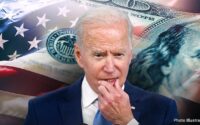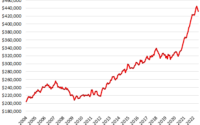Euro-Zone Activity Is Suddenly Shrinking in Recession Omen
(Bloomberg) — Sign up for the New Economy Daily newsletter, follow us @economics and subscribe to our podcast.
Most Read from Bloomberg
Private-sector activity in the euro area unexpectedly shrank for the first time since the pandemic lockdowns of early 2021, adding to signs that a recession might be on the horizon.
A survey of purchasing managers by S&P Global dropped to a 17-month low in July, dipping beneath the level that signals contraction. The downturn was driven by worsening output among manufacturers and a near-stalling of service-sector growth. Economists had expected a mild expansion.
“A steep loss of new orders, falling backlogs of work and gloomier business expectations all point to the rate of decline gathering further momentum,” said Chris Williamson, an economist at S&P Global. “Of greatest concern is the plight of manufacturing, where producers are reporting that weaker-than-expected sales have led to an unprecedented rise in unsold stock.”
The data underscores the vulnerability of the euro-zone economy that is now facing abrupt stimulus withdrawal after the European Central Bank’s half-point interest-rate increase, the first hike in more than a decade.
“We understand that these decisions are expected to mean slower economic growth due to more expensive loans and, unfortunately, uncreated and sometimes lost jobs,” ECB Governing Council member Madis Muller said in a blog post Friday. “But the consequences of persistently too-fast price increases would be even worse.”
Signs of slowing growth will reinforce the growing chorus of economists predicting a recession in the 19-member currency bloc later this year. Energy supplies are a major worry as Russia reduces natural gas flows in response to Western sanctions over its invasion of Ukraine.
An index earlier showed German activity unexpectedly shrinking, while the French report also signaled concerns of an economic slump.
European bonds rallied, with short-dated German debt leading gains. The two-year yield fell 22 basis points, set for the biggest slide in a month. Traders priced in 110 basis points of ECB hikes by year-end, a 20 basis points drop since Thursday, and also pared bets for a hike in September.
ECB President Christine Lagarde said on Thursday that it’s important to prevent expectations of higher prices from becoming entrenched, though she conceded that the economy is weakening.
Professional forecasters surveyed by the ECB earlier this month cut their outlook for growth next year to 1.5% from 2.3%, according to a quarterly report published Friday. They also raised their longer-term inflation estimate to 2.2%.
Companies are lowering their outlooks, constraining input purchases and pulling back on hiring, according to Friday’s report. Williamson predicted production will probably need to be reduced as firms adapt to the weaker-demand environment.
“With the ECB raising interest rates at a time when the demand environment is one that would normally see policy being loosened, higher borrowing costs will inevitably add to recession risks,” he said.
(Updates with market reaction in eighth paragraph)
Most Read from Bloomberg Businessweek
©2022 Bloomberg L.P.
[ad_2]
Source link


